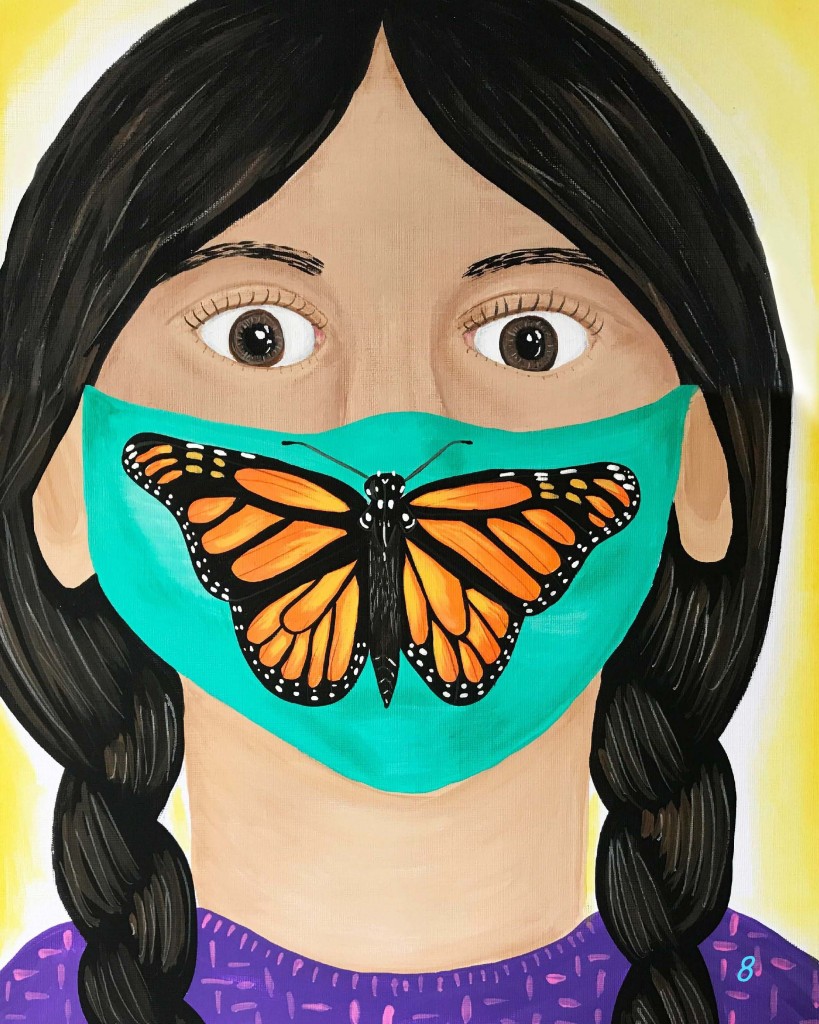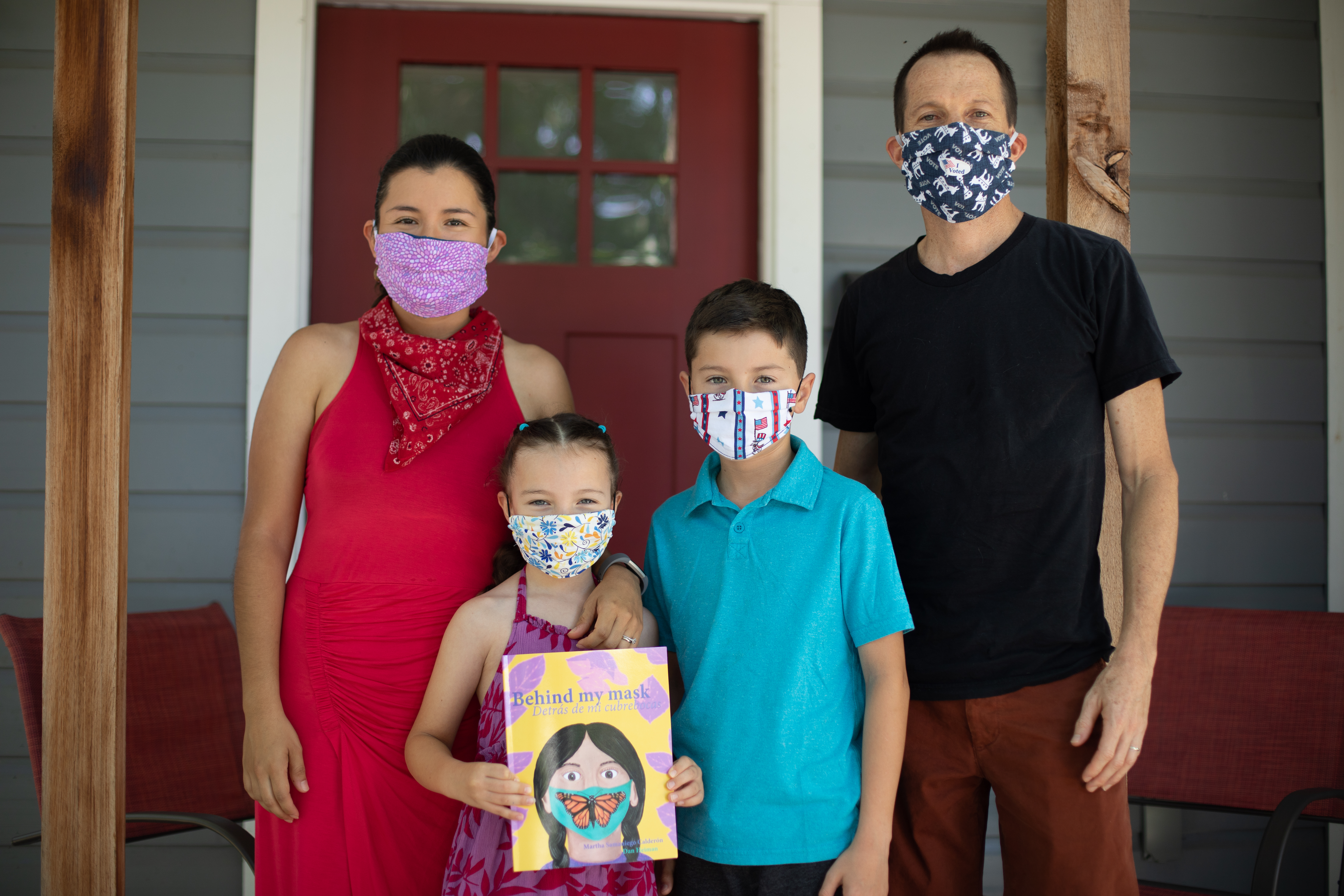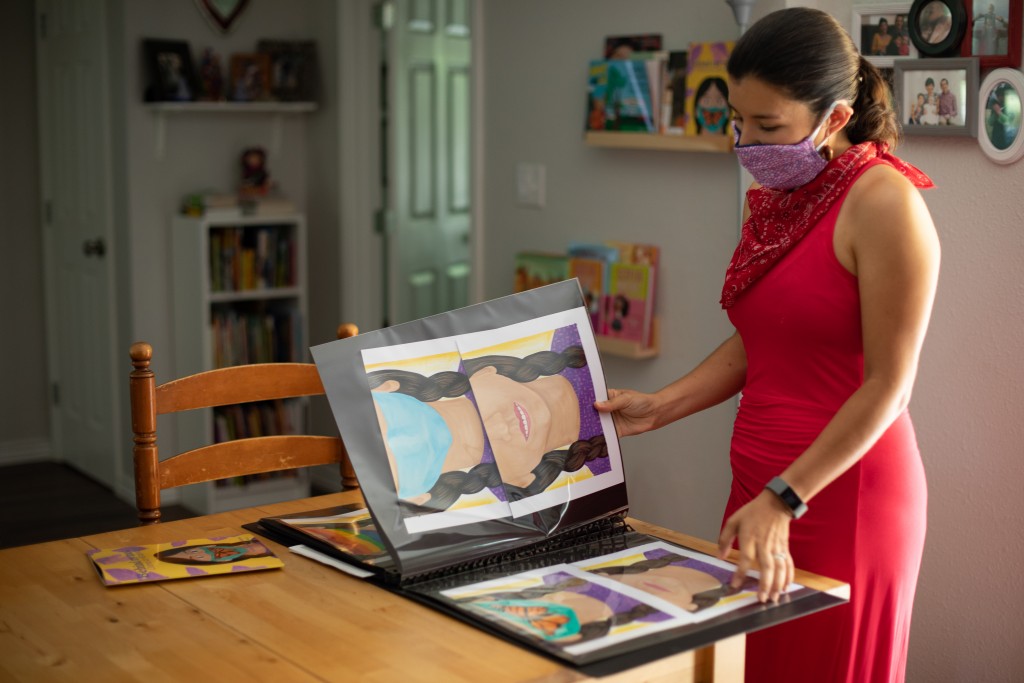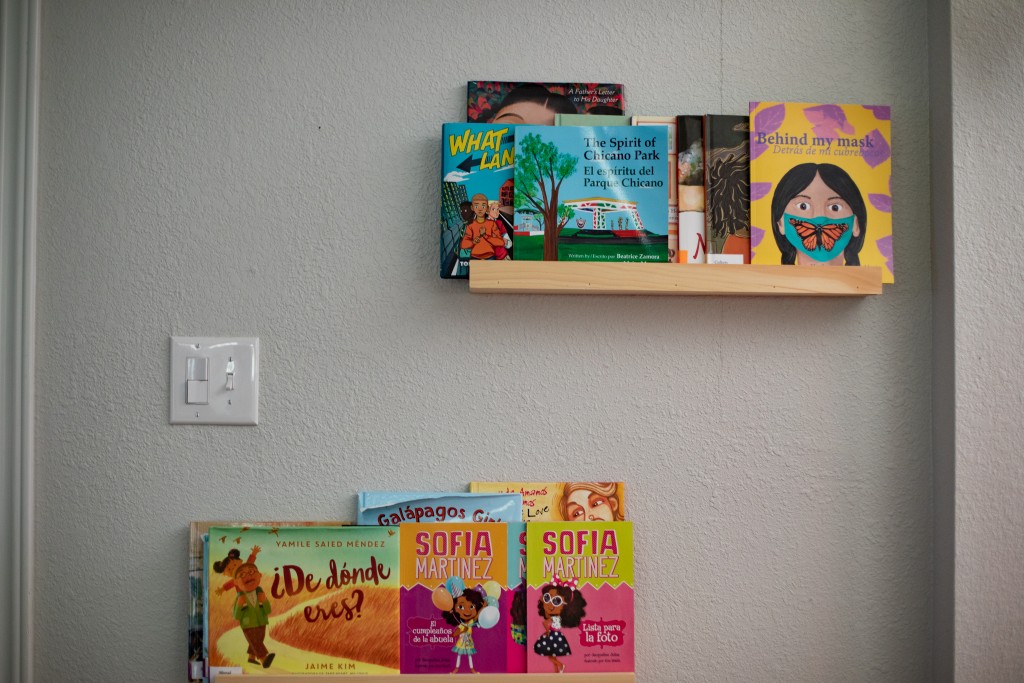A Denton Couple Wrote A Bilingual Book To Encourage Kids To Wear Masks
ArtandSeek.net July 30, 2020 20Getting ready to hit la piñata at Latinx birthday parties is arguably the most special moment of the celebration. Kids get in line and sing the popular Mexican piñata song that goes, “Dale, dale, dale, No pierdas el tino,” which roughly translates to hit the piñata and don’t miss.
But for 7-year-old Natalia Heiman Samaniego, this moment causes her a little bit of anxiety. She doesn’t like having to cover her eyes with a blindfold to hit la piñata.
“You can’t put anything to cover her (Natalia) eyes,” said her mother Martha Samaniego Calderón. “She has always been scared of that. So all of a sudden, having to see that people had to wear masks was something very scary for her.”

A picture of the butterfly mask, which represents immigration, from the book “Behind My Mask, Detrás De Mi Cubreboca.” Photo credit: Martha Samaniego Calderón.
At the beginning of the pandemic Calderón, who’s also a graduate of art education at the University of North Texas and her husband Dan Heiman, assistant professor of bilingual education at UNT, were having a hard time convincing their daughter Natalia and son Nicolás, 11, to wear masks.
“Me se sentía muy como no quiero usar una máscara y toda la gente tenía máscara y yo estaba como que yo no,” Natalia said in Spanish. She said she didn’t want to wear a mask.
Calderón said during the pandemic, her daughter’s fear is amplified. Every time the family grabs their masks to leave the house, Natalia hesitates.

Martha Samaniego Calderón and Dan Heiman pose for a portait with their children Nataly and Nicolas, at their home. Photo credit: Keren Carrión.
Confronting COVID-19 Fears In Spanish-Speaking Families
Listen to Martha Samaniego Calderón as she reads an excerpt from her children’s book, “Behind My Mask, Detrás De Mi Cubreboca.”
In order to explore those emotions, Calderón began talking to her kids about their feelings and COVID-19. Natalia would tell her mother how sad she felt about people having coronavirus and how much she missed friends and soccer team.
“Books have always been part of our lives. So we decided to create a children’s picture book,” Calderón said.
Calderón knew she wasn’t the only parent having conversations about COVID-19 with her kids. So, she and her husband decided to self-publish a bilingual children’s book called, Behind My Mask or Detrás de Mi Cubrebocas.
“What’s really interesting is that in the DFW metroplex, we have the growth of dual language programs where Spanish isn’t used as a transition. It’s actually used as a way to foment bilingualism and biliteracy and biculturalism in students,” Heiman said.
He said having the book available in both languages is very important, especially in the North Texas community. Dallas Independent School District has the largest number of dual-language campuses in Texas.
Latinos make up more than 40% of the population in Dallas County. According to the Texas Tribune, Tarrant County continues to see the fastest growth of Hispanic residents in the state. Since the start of the pandemic, KERA has reported a dramatic increase of COVID-19 cases among North Texas Latinos. For all these reasons, the Denton couple felt it was necessary to continue spreading the message: Masks save lives.
“I think it’s really important as educators and as parents that we really address what kids are feeling in terms of their emotions and their identities,” Heiman said.
The book tackles the importance of wearing a mask by following a young Latina who explores her emotions during the pandemic. There are a total of five masks and each represents an emotion and social issue.
“Naming emotion is so important. It’s so important because you bring to light these emotions like fear, anxiety,” Calderón said.
A Way To Embrace Masks And Challenging Topics

Martha Samaniego Calderón goes through her scrapbook of of the art of the book, and shows how she conceptualized the cover for “Behind My Mask, Detrás De Mi Cubreboca.” Photo credit: Keren Carrión.
The book starts introducing the first mask, a blue one dedicated to essential workers. There’s a monarch butterfly representing migration, a symbol often associated with immigrants or immigration. A rainbow flag is for the LGBTQ community. And one mask just bears the message “hate is a virus,” representing the xenophobia the Asian community has experienced during COVID-19.
Calderón points out that masks can make it harder for people – especially people who have experienced racism – to determine if a space is safe
“For Latinos, and minorities and any marginalized communities, the impact of wearing a mask, it goes to a level that not many people can understand,” Calderón said. “With the current political times we’re living in for me, it’s very important to read people’s emotions and faces and gestures.”
Calderón, an immigrant from Veracruz, Mexico, has experienced racism in North Texas, like when speaking Spanish to her kids at grocery stores. She uses the book to talk about this with her kids.
“It is important for us, the Spanish community, to start reaching out to our young ones and start telling them to wear a mask. What I tell parents is to buy a mask that has Pokémon, whatever the kid likes,” said Alexandra Tique, a bilingual licensed clinical social worker with North Texas Area Community Health Centers. She works closely with children and teens.
Tique said many parents are struggling with these conversations, but they can play an important role in helping children make sense of these feelings and COVID-19.
“Parents should set an example. They should wear them and not talk bad about wearing one, because masks save lives,” she said.

A collection of children’s books, along with “Behind My Mask, Detrás De Mi Cubreboca,”are displayed in Martja and Dan’s home. Photo credit: Keren Carrión.
The Denton couple want their book to give kids a voice to talk about the challenges of living through a pandemic and current political events.
“The political aspect of the book has taken on even more urgency,” Heiman said. “We had no idea that our book would be published four days before the George Floyd incident and the mass protests against anti-blackness.”
The book does not have a Black Lives Matter mask, but there’s a section at the end where kids can draw their own.
“We can’t control what happens outside. We can’t control the COVID-19 virus. But we do have control about certain things,” Calderón said.
She said the book has helped her family tremendously.
And Natalia? COVID-19 still makes her sad; and she misses her friends and her soccer team. But she isn’t afraid anymore.
“Mamá me estaba diciendo que tenemos que usar una máscara. Y por que el libro que hicieron me inspiro a que use una máscara,” Natalia said in Spanish.
Her parents’ book has inspired her to wear a mask.










